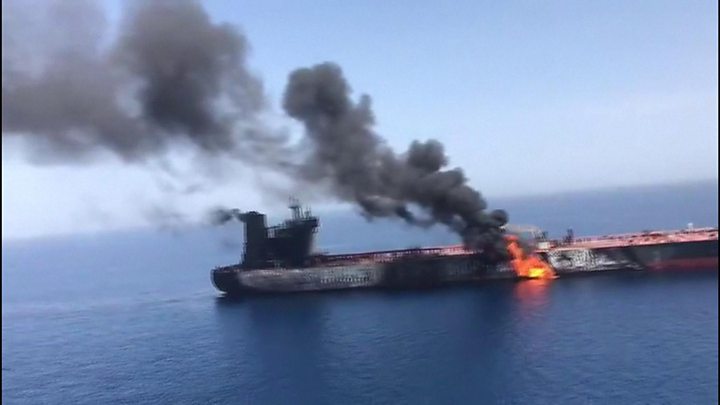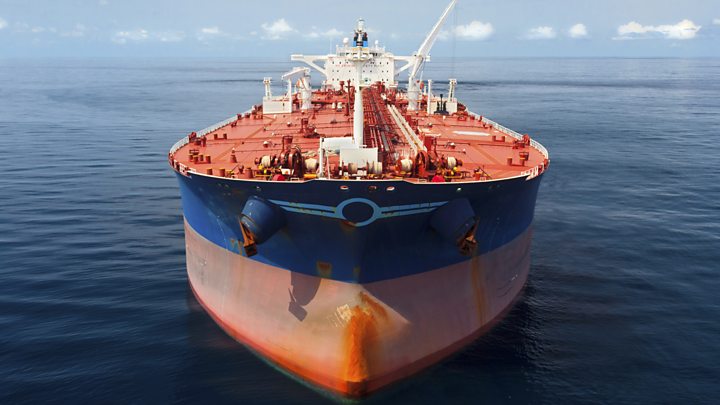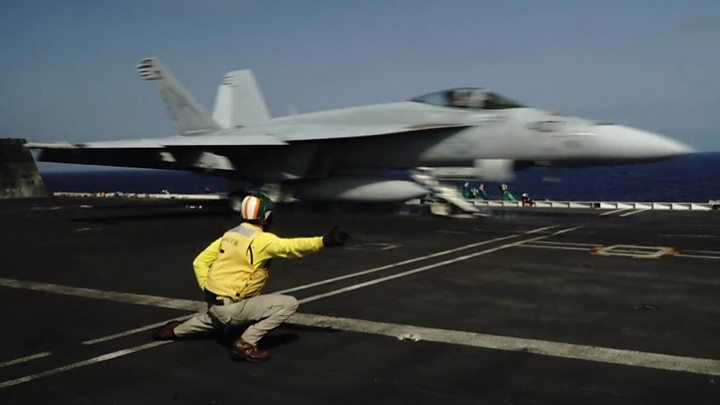Home » Middle East »
US blames Iran for attacks on oil tankers
US Secretary of State Mike Pompeo has blamed Iran for “unprovoked attacks” on two oil tankers in the Gulf of Oman.
He said the US had made its assessment based on intelligence about the type of weapons used.
A senior Iranian official earlier told the BBC “Iran has no connection” with the explosions on Thursday morning.
Dozens of crew members were rescued after the blasts on the Japanese-owned Kokuka Courageous and the Front Altair, owned by Norway.
Both Iran and the US said they evacuated the crew.
The blasts in one of the world’s busiest oil routes comes a month after four oil tankers were attacked off the United Arab Emirates.
No group or country has admitted the incident in May, which also caused no casualties.
The US at the time blamed Iran – but Tehran denied the accusations.
Oil prices jumped as much as 4% after Thursday’s incident.
The Gulf of Oman lies at one end of the strategic Strait of Hormuz – a vital shipping lane through which hundreds of millions of dollars of oil pass.
What did Mike Pompeo say?
“It is the assessment of the United States that the Islamic Republic of Iran is responsible for the attacks,” the US secretary of state said at a news conference in Washington.
“This is based on intelligence, the weapons used, the level of expertise need to execute the operation, recent similar Iranian attacks on shipping, and the fact that no proxy group operating in the area has the resources and proficiency to act with such a high degree of sophistication.”
“This is only the latest in the series of attacks instigated by the Islamic Republic of Iran and its surrogates against American and allied interests.
“Taken as a whole, these unprovoked attacks present a clear threat to international peace and security, a blatant assault on the freedom of navigation, and an unacceptable campaign of escalating tension by Iran,” Mr Pompeo said.
What do we know about the explosions?
The Norwegian Maritime Authority said earlier on Thursday that the Front Altair had been had been “attacked”, and that there were three blasts on board.
Wu I-fang, a spokesman for Taiwan’s CPC Corp oil refiner, which chartered the Front Altair, said it was carrying 75,000 tonnes of naphtha and was “suspected of being hit by a torpedo”, although this has not been confirmed.
Other unverified reports suggested a mine attack.
The ship’s owner, Frontline, said the vessel was on fire – but denied reports in Iranian media that it had sunk.
The operator of the Kokuka Courageous, BSM Ship Management, said its crew abandoned ship and were rescued by a passing vessel.
The tanker was carrying methanol and was not in danger of sinking, a spokesman said.
It is currently located about 130km (80 miles) from Fujairah in the UAE and 16 miles from Iran. The cargo remains intact.
The key thing now is to determine exactly what caused the damage to the two tankers in the Gulf of Oman, and that will provide powerful clues as to who may have carried out the attacks.
The US has a powerful naval presence in the region and will have a range of intelligence assets to draw upon.
A US official has already noted that they believe that they will be able to recover enough debris from the attacks “to come up with solid evidence for tracing them back to their source”.
What happens then is a question of strategic judgement.
Countries like France and Germany are already urging caution and pressing for a de-escalation.
But an attack on two merchant vessels in international waters is a hugely significant act.
And these latest attacks – unlike the sabotage with limpet mines a month ago – risked causing significant loss of life.
Who came to the rescue?
Iranian state media quoted government officials as saying that Iran had rescued all the crew members of both vessels and they had been taken to the port of Jask.
Iran’s Irib state television broadcast what is said was footage of the rescued crew members sitting on a sofa and chatting at the Iranian port of Jas.
The video was published by Iran’s Isna news agency with the caption that read: “Images of rescued members of the damaged ship in the Oman sea.”
? تصوير خدمه نجات يافته کشتي حادثه دیده در درياي عمان pic.twitter.com/KdTGYNJD6U
End of Twitter post by @isna_farsi
The US 5th Fleet, based in Bahrain, said it had sent the USS Bainbridge to assist.
Spokesman Josh Frey said in a statement: “US naval forces in the region received two separate distress calls at 06:12 local time (03:12 GMT) and a second one at 07:00.”
The US Navy later said 29 crew members from the Kokuka Courageous were taken on board the USS Bainbridge.
Why are US-Iran tensions so high?
In 2018, the US pulled out of the landmark nuclear deal reached in 2015 that was aimed at curbing Iran’s nuclear activities.
The move was strongly criticised by a number of countries, including America’s closest allies.
In May, President Donald Trump tightened US sanctions on Iran – mainly targeting its oil sector.
Iran then announced it was suspending some commitments under the nuclear deal.
In recent months the US has strengthened its forces in the Gulf – saying there was a danger of Iranian attacks.
It has sent an aircraft carrier strike group and B-52 bombers to the region.
In response, Iran has accused the US of aggressive behaviour.
Those tensions rose markedly after the 12 May limpet mine attacks in the UAE.
The UAE blamed an unnamed “state actor”.
The US said that actor was Iran, an accusation Tehran has denied.
How has the world reacted?
UN Secretary General António Guterres condemned Thursday’s blasts.
He told the Security Council that the world cannot afford “a major confrontation in the Gulf region”.
Meanwhile, the EU called for “maximum restraint”, while Russia said no-one should jump to conclusions or use the incident to put pressure on Iran, a Russian ally.
The incident is expected to be discussed at a closed-door meeting of the UN Security Council later on Thursday.
Paolo d’Amico, chairman of the tanker association, Intertanko, said the two vessels had been attacked, and expressed concern about dangers to other crews.
“If the waters are becoming unsafe, the [oil] supply to the entire Western world could be at risk,” he said.
Were you on board one of the tankers? Do you know anybody who was on board? If it is safe to do so, please share your experiences by emailing [email protected].
Please include a contact number if you are willing to speak to a BBC journalist. You can also contact us in the following ways:
Or use the form below
If you are happy to be contacted by a BBC journalist please leave a telephone number that we can
contact you on. In some cases a selection of your comments will be published, displaying your name as
you provide it and location, unless you state otherwise. Your contact details will never be published.
When sending us pictures, video or eyewitness accounts at no time should you endanger yourself or others,
take any unnecessary risks or infringe any laws. Please ensure you have read the terms and conditions.
Terms and conditions
The BBC’s Privacy Policy
Source: Read Full Article





